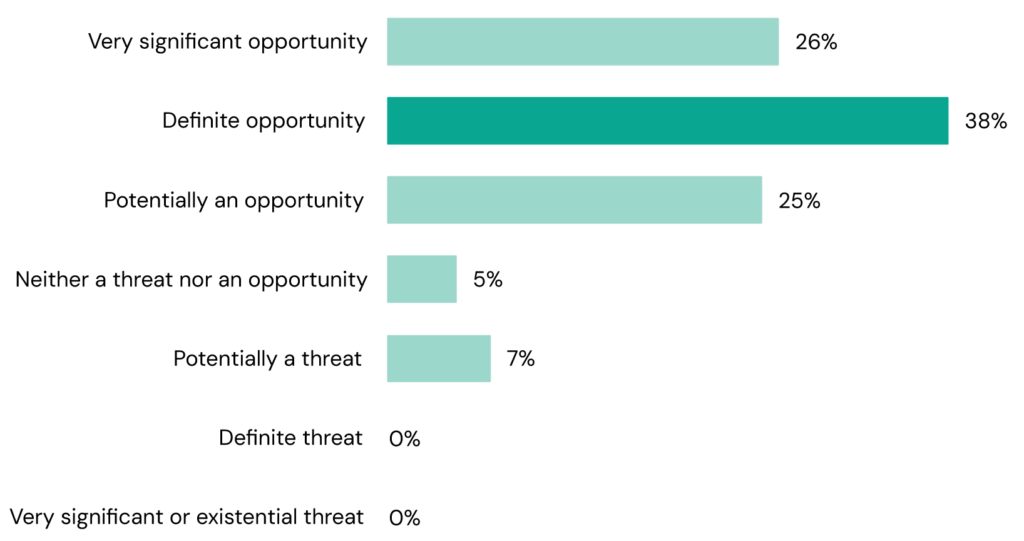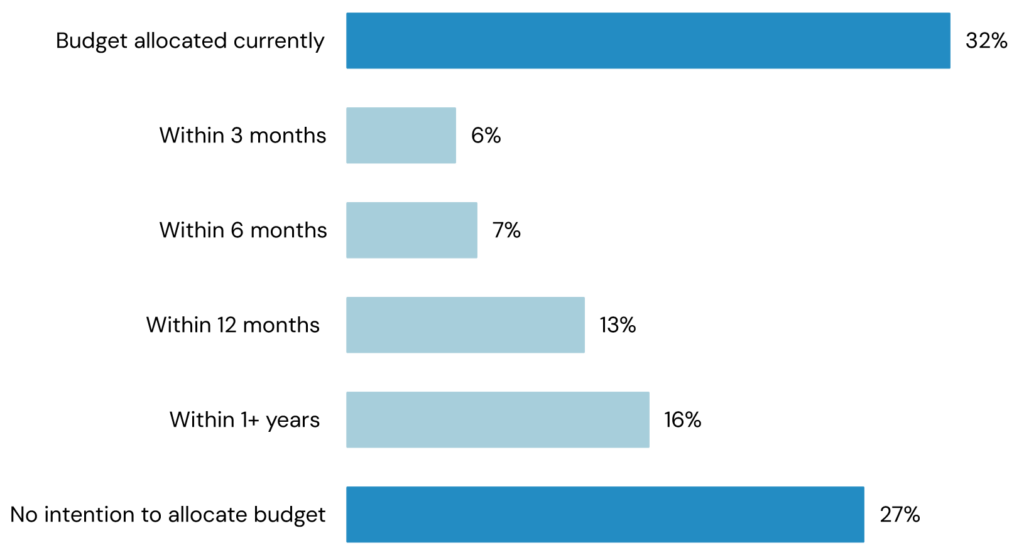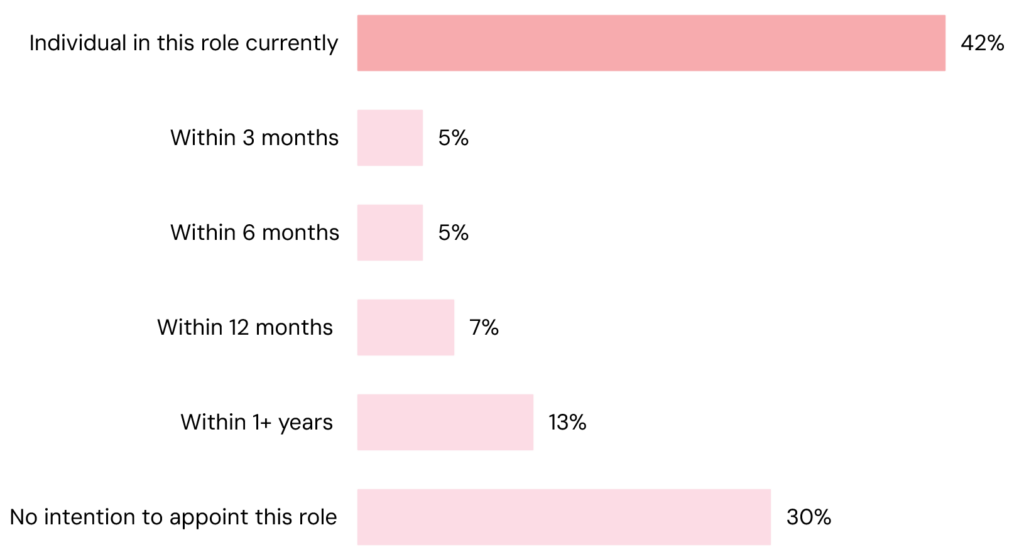Insights
How are SMEs approaching AI adoption?
Discover new insights into attitudes towards AI, as we analyse the views of senior business leaders from across our portfolio.
11 November 2024
Is artificial intelligence (AI) a threat or an opportunity for growing companies? Do small and mid-sized enterprises (SMEs) have the tools to capitalise on recent developments in AI? Speaking directly to senior leaders within our portfolio, we’ve gained a deeper understanding of how the UK and Ireland’s most ambitious businesses are approaching the adoption of AI technologies.
Below is a summary of our key findings. Read on to find out what’s on the mind of entrepreneurs right now — from family-run manufacturers to climate tech innovators.
Key insights
We’re proud to have backed more than 600 businesses to date, across a variety of investment stages, sectors and regions in the UK and Ireland. Thanks to our large and diverse portfolio of businesses, we’re in a unique position to report on the views and experiences of SMEs. And this includes the ever-evolving topic of AI.
This report is based on survey responses from 84 different businesses, all of which have raised growth capital investment from BGF. Taken together, they cover every sector of the growth economy, and every region in the UK and Ireland — providing a helpful representation of SMEs as a whole. Our biggest takeaways?
1 in 4
UK and Irish SMEs are already using generative AI in production
89%
of senior leaders believe AI presents an opportunity for their business overall
>50%
feel they have the necessary AI expertise within their business
1 in 3
have specific budget allocated towards their AI roadmap
Do SMEs see AI as an opportunity or a threat?
Analysing overall sentiment towards AI, we found that the level of threat perception amongst SMEs is relatively low. None of the survey respondents felt that AI posed a definite or existential threat to the future of their business. And although six respondents (7%) saw it as a potential threat, almost four times as many people (25%) felt it was a potential opportunity. Meanwhile, the vast majority (64%) of business leaders stated that AI was a definite or very significant opportunity for their companies.
What is your overall sentiment towards AI and the future of your business?

While the data suggests that SME sentiment towards AI is overwhelmingly positive, the impact that AI will have is no doubt nuanced, and varies considerably by sector and business model. For example, some respondents expressed concerns that AI would eventually make their products or services obsolete; others, however, are creating whole products or services around it, by developing AI-powered technologies themselves.
Opportunities
When asked about the potential benefits of AI, the majority of business leaders recognised its ability to increase productivity and operational efficiency – by reducing the amount of time required to complete traditionally manual tasks.
One of the most frequently mentioned areas, in terms of potential productivity gains, was customer support. Many respondents believed that AI-powered chatbots or virtual assistants will greatly improve the speed, cost and quality of their customer service (whether that’s answering queries, locating helpful resources, or providing personalised product recommendations).
“We have over 20,000 customers and dealing with their day-to-day queries is labour-intensive. AI will enable us to remove a lot of the manual input required here.”
Aaron Mooney
CEO of Action24
Other common themes included data analytics and reporting, as well as content creation (in particular, imagery and video generation). While some felt that the quality of AI output, especially sales and marketing content, still needed improvement, many emphasised the potential for additional cost savings here, by being less reliant on third-party tools and agencies.
“The introduction of generative AI, especially through advancements in large language models and image and video generation, presents a significant opportunity for our business.”
Stuart Young
CEO of Panthera BioPartners
Several respondents also mentioned HR (human resources) as a key area in which AI could streamline processes, including employee learning and development (tailored resources and e-learning modules, based on individual needs) and recruitment (job advert optimisation and applicant management, for instance).
Threats
When flagging the potential threats associated with AI, there was a clear and dominant theme: competition. Many business leaders felt that AI would significantly reduce barriers to entry, enabling new competitors to enter niche sectors, and create copycat products, more easily. In addition, they felt AI would introduce an extra layer of competition amongst incumbents, based on who was able to adopt AI fastest or most effectively.
“For us, the potential market disruption comes from our competitors being able to make step changes with the latest AI capabilities and impacting the commercial environment. There’s potential for (highly scalable) new entrants to serve clients, using a fraction of the human intellectual capital of existing providers.”
Dominic Carroll
Director of Portfolio at e2e-assure
Several respondents also felt that the threat of competition would only be exacerbated by the rapid rate of change in AI development right now. There were concerns around the possibility of new legislation around data governance and content ownership, which could make it harder to keep up or retrain staff, with some stating that the current costs of doing so were already prohibitive.
Security was another area of concern. A number of respondents referred to the increased threat of cyberattacks and the potential for data breaches and/or misuse (including customer data, company IP, and other confidential information). Having said that, other felt that AI presented an opportunity for IT and security teams, and that it could be used to enhance cybersecurity threat monitoring and responses.
Overall, a wide range of threats were identified, from algorithmic bias and ESG challenges to reputational damage and even job loss. But many agreed that, despite its potential pitfalls, the biggest risk to their business would come from ignoring AI altogether – failing to adapt and falling behind the (increased) competition.
How prepared are SMEs for advancements in AI?
Given concerns around keeping up with the latest AI developments, it may come as no surprise that one in three business leaders already had budget allocated towards their AI roadmap. Of those that didn’t yet have funds set aside for AI-related projects, 37% intended to do so within the next 12 months. Clearly, for many SMEs, AI is a key area worth investing in right now.
How soon do you intend to allocate budget towards your AI roadmap?

Nonetheless, around a quarter of survey respondents hadn’t specifically allocated budget towards AI yet, nor did they have any intention of doing so in the near future. While some business leaders cited competing priorities as the reason for this, others were just too early on in scoping to know what their AI strategy (and thus, the required budget) would look like. Several respondents simply didn’t see the need for a separate AI budget, as it was already entrenched in their other business areas.
In terms of expertise, around half of business leaders surveyed felt they already had the necessary skill in-house to use AI tools and technologies effectively. And those that said they lacked this expertise were already looking at a number of different methods for closing the AI skills gap, including additional training, recruiting new employees, and receiving support from external consultants or contractors.
Do you feel you have the necessary expertise within your business to use AI tools and technologies effectively?

A significant proportion (42%) of respondents said they already have a senior team member that’s responsible for AI projects within the business. And while 30% said they don’t intend to appoint anyone to this role, the remaining 28% are aiming to do so in the future.
How soon do you intend to appoint a senior individual responsible for AI in your business?
“I’m not surprised to see how many SMEs feel they have the people and skills required to embrace AI technology. I think this is down to the intuitive nature of AI tools — how naturally they integrate with current systems and how easily end users can interact with them.”
Simon Steward
Head of Digital at BGF
How are SMEs currently using AI?
As expected, some SMEs are much further along than others, when it comes to deploying AI within their businesses. While 11% of respondents said they were not currently considering generative AI, 26% were already using it in production. A further 19% had working AI prototypes or were in testing.
How progressed is your business with generative AI?

Among those who had already implemented AI successfully, many were in the process of enhancing their product offerings, data analysis or customer service delivery. The use of AI by tech and software engineering teams, particularly for code generation, was also a common AI use case and an increasingly mature one.
But the most popular solution for SMEs, and the most embedded so far, seems to revolve around content creation; a large number of SMEs were already using generative AI to produce marketing collateral, and across all their teams to draft emails, summarise documents and transcribe calls.
Unsurprisingly, the vast majority (83%) of business leaders that were already deploying AI solutions, had identified AI as a very significant or definite opportunity for their company. Yet even among those that were not currently considering AI, just one person viewed it as a potential threat (while most felt it was a potential opportunity for the business).
Case study: Medigold Health
Medigold Health is a leading provider of occupational health services in the UK, which helps businesses to keep employees healthy, while reducing costs and adding value for corporate customers.
Since BGF’s investment into Medigold in 2017, to support its acquisitive growth strategy and ongoing innovation, the company has developed Paradigm — an AI-powered module, designed to enhance the efficiency of medical reporting and streamline clinician workflows.
“Occupational healthcare faces a shortage of clinicians, so reducing administrative burdens is crucial. Assistive technology, particularly with report generation, is saving clinicians time, leading to a 58% rise in clinician retention and greater job satisfaction.”
Alex Goldsmith
CEO at Medigold Health
Implemented initially for Management Referrals, a major revenue-generating service, Paradigm enables clinicians to handle these cases more efficiently, while maintaining human oversight, to ensure quality. Since its introduction, Paradigm has helped clinicians focus more on patient care and less on admin, significantly improving work-life balance and engagement.
“The launch of Paradigm in March has been very successful, with over 70,000 case reports already produced. It has allowed consultation time to be reduced, meaning more cases can be seen and more people helped.”
Jonathan Behr
Clinical Innovations Director at Medigold Health
Medigold Health is now exploring further applications of AI, to enhance pre-consultation processes and improve the experience for both customers and employees across its services.
Maximising AI’s potential for business value
It’s clear that many leaders are already well underway in implementing AI-powered technologies within their businesses, but that AI readiness varies considerably across SMEs.
Looking for a helping hand in developing and delivering your company’s AI roadmap? All of the businesses we surveyed have had extensive access to our people, networks, and decades-long experience of helping good companies to grow. Our Portfolio and Value Creation teams provide scaleup support throughout the lifecycle of our investments.
Whether you’re building out your digital transformation strategy or securing against cyber threats as you scale, our tech experts can help take your business to the next level.
Learn more about our Value Creation offering here.










